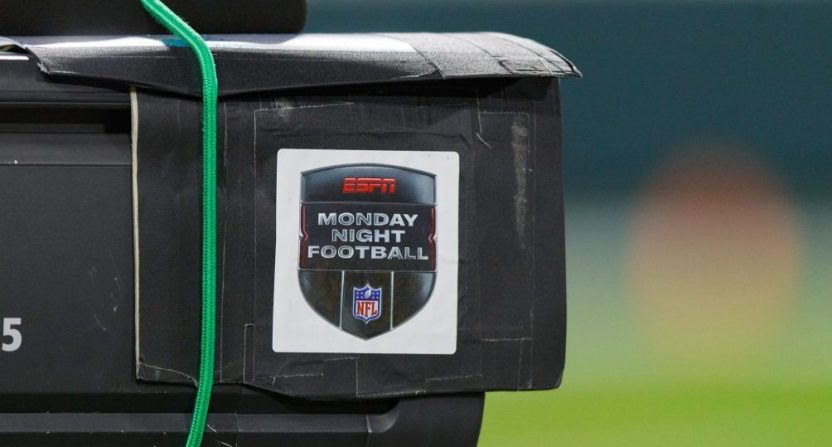Ever get tired of only having one game to watch at a time during the NFL’s primetime schedule? ESPN has a feeling you might.
Which is a part of the reason why the upcoming Monday Night Football doubleheader won’t feature two games airing consecutively, but rather two games that overlap. The Carolina Panthers will host the New Orleans Saints at 7:15 p.m. ET on ESPN and ESPN 2 and the Pittsburgh Steelers will face the Cleveland Browns at 8:15 p.m. ET on ABC.
“The thought there is, can we combine total audience and do a little bit like we used to do in the old days of college football where we create a simultaneous national and regional appeal and use our networks to do that in a single window?” ESPN president of content Burke Magnus told The Athletic’s Richard Deitsch. “Then it combines to sort of like a super audience total number.”
The strategy actually began last season, when instead of a traditional back-to-back doubleheader with one game on the East Coast and one game on the West Coast, ESPN and ABC aired two games that started 75 minutes apart from each other in primetime. The ESPN/ESPN 2 broadcast of Bills vs. Titans drew 7.92 million viewers for a 4.25 rating, while ABC’s broadcast of Eagles vs. Vikings drew 12.86 million viewers, good for a 7.0 rating.
Comparatively, the most recent traditional Monday Night Football doubleheader, which occurred in 2020 (no doubleheader took place in 2021), saw the early game between the Steelers and Giants draw 10.76 million viewers (a 6.1 rating) and the late game between the Broncos and Titans draw 7.70 million viewers (a 4.6 rating), with both games airing on ESPN. While it’s notable that airing one of the games on ABC puts the product in more homes, the experiment of overlapping games was successful enough to continue for another year. But ESPN is still working out some kinks.
“We’re going to learn more about what optimizes best, and I think by next year we’ll continue to hone on driving the biggest viewership between the two games,” Magnus told Deitsch. “We will learn if it is better to start with the ABC game, the ESPN game, or the other way around.”
The experiment will continue later this season, when ESPN hosts another doubleheader in Week 14—this time with both games (Dolphins vs. Titans on ESPN and Giants vs. Packers on ABC) beginning at 8:15 p.m. While there are plenty of variables—none greater than the quality of each game—it will be interesting to see what ESPN (and other networks) learn from this experiment and how the information is applied moving forward.







